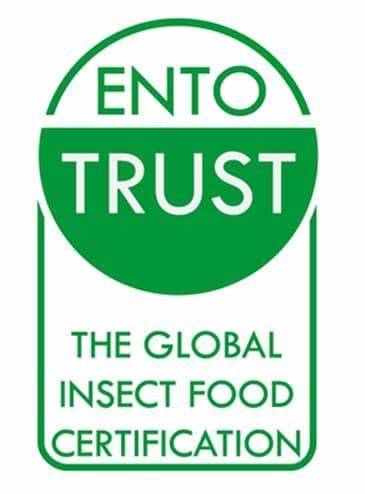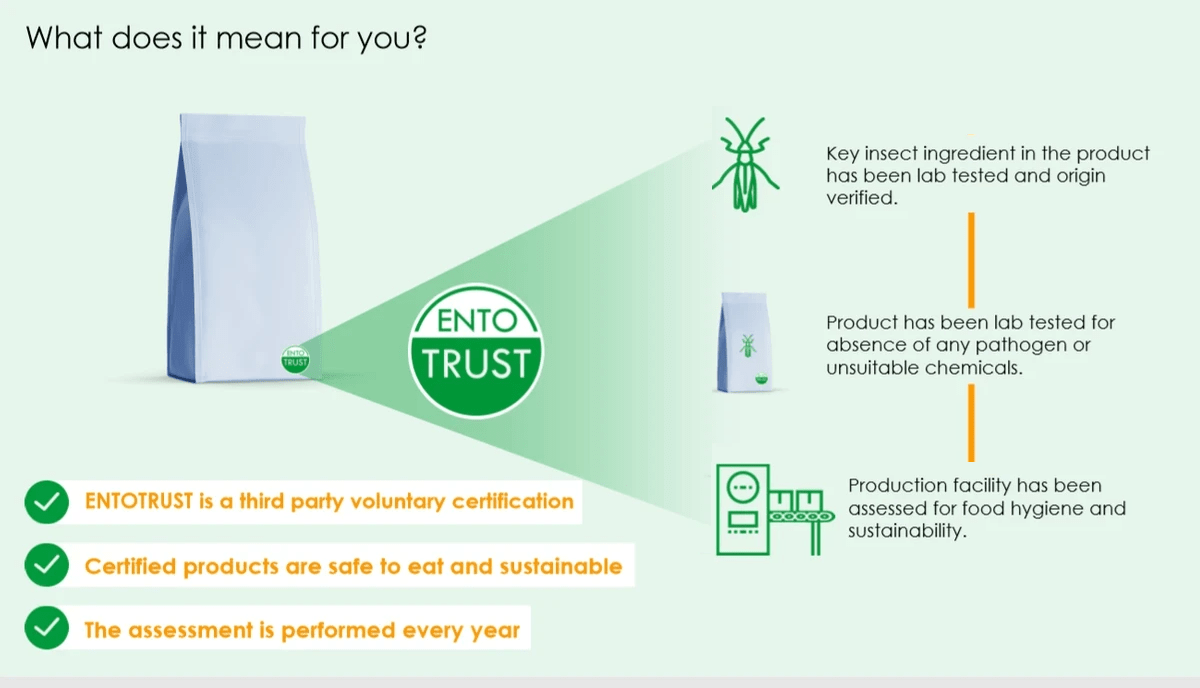Interview with Mauro Bianchi co-founder of Entotrust
Tell us briefly the idea behind Entotrust
It all started with our founders, international citizens and sustainability activists. They realized that transparency on food origin, quality and environmental care are must. Who is valuing conscious producers? There was a need for an independent organization to promote good practices. We are a group of experts in quality assurance, biology, nutrition, international operations and marketing.
We have thus created the first certification for food safety and sustainability of insect-based foods. We read a lot about alternative proteins, and the narrative is the same among all the operators of this new sector, what we see instead is the presence of many new businesses, with little experience in food and with processes not always sustainable, due to the environmental impact or the employees’ working conditions.
Many start-ups are appearing in the market, and most of them are tiny operations, we may call them “garage kitchens”. If a garage may be ok to start in the software industry, it is not the right approach in the food business. The Entotrust certification creates a clear difference for high quality products, maintained as such with standard processes and employees trainings, versus the rest of the market.
There is no improvisation into the food production, especially in this delicate phase where consumers are getting used to these new alternatives, it is crucial to avoid any food safety accident.
What’s Entotrust?
ENTOTRUST is the voluntary certification of insect-based foods, which allows producers to communicate their safety and environmental sustainability. ENTOTRUST’s mission is to recognize and report quality products based on edible insects and the logo can only be used by certified producers and farmers. The ENTOTRUST program envisions a world where insects will provide healthy foods, high-value proteins, accessible to a large part of the population, with environmental and social benefits.
Who can get certified?
Both producers and farmers of insect food intended for human consumption, that has passed the laboratory analysis as the assessment of the processes along strict requirements. Where possible we verify the complete value chain from the farm to the plate.
What control systems have you setted up to verify the consistency between the declarations of the requesting subjects and the actions/operations of the companies?
Certification is obtained by responding to specific checklists concerning both food safety, company processes and practices in terms of environmental impact and social fairness. Verification is carried out through meetings, video calls, documentary evidence and photos, where necessary one of our auditors’ visits to the company premises. Furthermore, our accredited laboratory yearly carries out analyses on certified products, as a necessary condition for the renewal of the certification.
If the consumer buys an edible insect product that carries the Entotrust logo, what additional guarantees should he have?
Entotrust certification differentiates products that have it from those without. The Entotrust brand is evidently synonym of a product evaluation carried out by third parties, and was designed with a highly recognizable name and icon, which speaks a simple language for the consumer.
Differently from other schemes adopted in food and mainly for B2B (eg. GFSI, BRC, HAACP), which remain topics obscure to the public, without evidence on the product packaging.
Also on our web site there are different levels of reading for producers but also for consumers, highlighting to the latter that an Entotrust certified product reflects two fundamental requirements:
It is absolutely safe for human consumption.
The company that produces it carries out its activities in a manner that respects the environment and people.
How many companies have joined so far?
Since we began our adventure, over 150 companies have applied to be certified, from all parts of the world, from Australia to Portugal. After an initial meeting and a pre-selection, those who have successfully achieved Entotrust certification are 20, with dozens of certified products or in the process of being certified. The requests go on and despite the pandemic, we are very satisfied with the results achieved, and with the value we offer both to producers and consumers. This is also reflected in more than one independent research where, for example appears from interviews with a sample of consumers (in Europe) that perceived food safety increases by 40% for a product with Entotrust logo in comparison to a product without, going with a general higher purchase intention and visual appeal.
What’s your forecast about the development of the sector (feed and food) in the coming years?
Even if our focus is on food, therefore only human nutrition, we have noticed how the use of insects in the production of feed, both for scale farming and for domestic animals (pet-food) has taken hold thanks to a clearer and more liberal regulation.
Unlike food, which goes at a different speed, and this depends precisely on a different regulatory framework, which today can be defined as selective, slow and defensive. Selective and slow as the authorizations are assigned to the single company (product and specific production process) that does the application, after an average of 12 months from the submission of the application. Defensive as it could be deduced that the interests’ behind traditional proteins (farmed meat) towards alternative ones certainly have a greater voice at European level. Nevertheless, as can also be seen in other sectors, the need for sustainability is driving change (for example the abolition of single-use plastics; the adoption of a single charging standard for electronic devices); the way towards sustainable proteins, not only of vegetable origin, it is traced and necessary, therefore it is only a matter of working seriously daily to make the consumer appreciate the versatility of insect flours and the many products that derive from them, offering familiar products that simplify their daily adoption. There are indeed positive signs, for example, large retailers are starting to include products based on insects, and Entotrust certificated, as it has happened in the last year for the Lidl and Kaufland supermarket networks in Europe.
Clic here for more info






